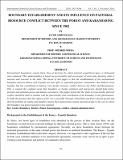| dc.contributor.author | Ogola, Jacob Adipo; Ndeda, Mildred A. J. | |
| dc.date.accessioned | 2020-12-01T12:41:08Z | |
| dc.date.available | 2020-12-01T12:41:08Z | |
| dc.date.issued | 2016 | |
| dc.identifier.uri | https://repository.maseno.ac.ke/handle/123456789/3173 | |
| dc.description.abstract | International boundaries remain finite lines of divisions by which national geopolitical space is delineated
and contained. This understanding is based on territoriality and sovereignty of each state denoting what is
internal and external to the state. The thrust of this paper is that the establishment of the international
boundary between Kenya and Uganda not only split or separated pastoral communities that hitherto lived
together but has contributed in fueling cross border resource conflict between the Pokot and Karamojong.
This is against the cardinal norm that boundary or border relations and interaction should help foster,
promote and maintain peace and human coexistence. This paper posits that the study of cross-border pastoral
conflict should be done in tandem with the functionality and contribution of the boundary to the phenomenon.
It holds the position that the rapture of the vice is faceable through colonialism and Post colonial period and
that the problem of rusting and banditry among these pastoralists remain unresolved due to the way in which
the boundary was perceived and is now manned | en_US |
| dc.publisher | International Journal of Social Science and Technology | en_US |
| dc.subject | Boundary, Border, Pokot, Karamojong, conflict, colonial administrators. | en_US |
| dc.title | Boundary establishment and its influence on pastoral resource conflict between the Pokot and Karamojong since 1902 | en_US |
| dc.type | Article | en_US |

